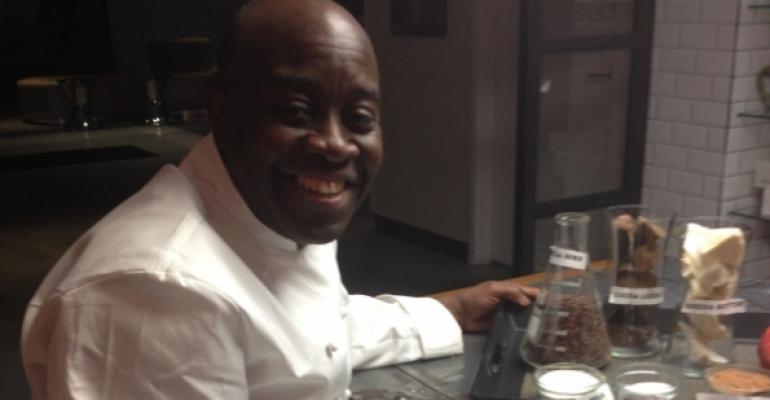Valentine’s Day puts unreasonable expectations on couples and makes single people feel bad. But a lot of chocolate eating happens on and around February 14, and I’m a serious supporter of that.
So for this Valentine’s Day I’d like to talk about François Kwaku-Dongo and his chocolate.
Kwaku-Dongo is a well-respected chef who cut his teeth at excellent restaurants in New York City in the early 1980s. He’d arrived from his native Ivory Coast to be a translator at the United Nation’s, but he was intrigued by the gastronomic diversity of the city and ended up working in restaurants instead. In 1989, he was taken under the wing of Wolfgang Puck and spent many years at Spago, Chinois on Main, Postrío and other Puck restaurants before his mentor sent him first to France and then to Japan to further his culinary education.
Now Kwaku-Dongo’s in New York City suburb of Greenwich, Conn., at JHouse, a former Howard Johnson’s converted into a swanky hotel (iPads control in-room temperature, lighting and window shades; the toilets raise and lower their lids manually and their seats are heated). There he makes Puck-style gourmet pizzas, his own slow cook roasted chicken that’s one of the best I’ve ever had, and other modern American food, and sushi (why not).
He also has his Chocolate Lab, a pastry and gelato shop as well as a place where the chef makes his own chocolate.
Really; it’s his own chocolate.
François Kwaku-Dongo is a member of the Baoulé ethnic group, who are traditionally farmers in West Africa. Kwaku-Dongo grew up attending school in Eastern Ivory Coast during the week and living and working on his father’s cacao plantation, about a 45-minute bus ride outside the city, on weekends.
“Come Saturday morning, everyone had to go work their own little parcel, because that’s how we paid for our uniforms and our food,” Kwaku-Dongo told me. “That’s how we made our living, and it was part of the family … It was my grandfather’s way of saying, if you want to succeed, you have to work.”
Kwaku-Dongo and his brothers and cousins would pick and break open the large cacao pods and lay out the beans on banana leaves or wooden blocks to dry for a week or more. “Then would put them in burlap sacks and take them to the port,” he said. All of the further processing and value-adding was done overseas, mostly in Europe.
For years, the chef had wanted to do something about that, like set up his own cacao production facility in Ivory Coast. Instead, in 2006, he teamed up with his friend Steve Wallace and became a partner in Omanhene, Wallace’s company in Ghana, just east of Ivory Coast. Omanhene ferments, conches and processes their beans into bars, and only then are they shipped overseas — to a packaging plant in Milwaukee, Wis.
That keeps much more of the money raised from growing cacao in Ghana, where it can help the people growing it.
“One of the things we did was make sure that not only are the farmers given days off and decent pay, but also health insurance is paid by the company,” Kwaku-Dongo said. “So basically it’s providing them with the basics they need and also remunerating them for the work that they do. Some people call it ‘fair trade,’ but we don’t call it fair trade because it’s something that should be done that way anyway. “
Also, Fair Trade is a specific certification program that Omanhene doesn’t use.
Kwaku-Dongo says chocolate from Omanhene — the name means “paramount leader” in Akan, the language of the Baoulé and related groups — reminds him of the smell of the drying cacao pods of his childhood. He said it has a certain “harshness” that was missing in the chocolate Oscar statuettes he made for Puck when they were entertaining for the Academy Awards.
That was the first time he’d tasted chocolate, and to him it had no resemblance to the product he’d harvested in his childhood.
However his chocolate does remind him of cacao’s essence.
I didn’t try the straight-up bars that Kwaku-Dongo and his staff are working with at the Chocolate Lab. Instead he gave me finished truffles and croquantes, flavored with coconut and lavender and sea salt and whatnot. To me they tasted like good chocolate, but I have to admit I didn’t detect any single-origin Ghanaian harshness.
But it’s possible I just didn’t know what to look for.

